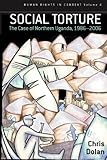Social Torture : The Case of Northern Uganda, 1986-2006 / Chris Dolan.
Material type: TextSeries: Human Rights in Context ; 4Publisher: New York ; Oxford : Berghahn Books, [2009]Copyright date: ©2009Description: 1 online resource (338 p.)Content type:
TextSeries: Human Rights in Context ; 4Publisher: New York ; Oxford : Berghahn Books, [2009]Copyright date: ©2009Description: 1 online resource (338 p.)Content type: - 9781845455651
- 9781845459123
- 967.61044
- DT433.285 .D65 2009
- online - DeGruyter
| Item type | Current library | Call number | URL | Status | Notes | Barcode | |
|---|---|---|---|---|---|---|---|
 eBook
eBook
|
Biblioteca "Angelicum" Pont. Univ. S.Tommaso d'Aquino Nuvola online | online - DeGruyter (Browse shelf(Opens below)) | Online access | Not for loan (Accesso limitato) | Accesso per gli utenti autorizzati / Access for authorized users | (dgr)9781845459123 |
Frontmatter -- CONTENTS -- List of Figures -- Foreword -- Acknowledgements -- Abbreviations -- Map of ‘Protected Villages’ in which Fieldwork Was Conducted -- 1. Introduction -- 2. The Research Process -- 3. An Overview of the Situation in Northern Uganda -- 4. Reconsidering the LRA–Government Dynamic -- 5. Protection As Violation -- 6. Protection As Debilitation -- 7. Protection As Humiliation -- 8. Social Torture and the Continuation of War -- 9. Conclusions -- Annex A. Testimony of a LRA Soldier who Returned under Amnesty, October 2001. Recorded April 2002, Kampala -- Annex B. An Account of the 1994 Peace Talks -- Bibliography -- INDEX
restricted access online access with authorization star
http://purl.org/coar/access_right/c_16ec
As Director of the Refugee Law Project at the University of Makerere, Kampala, Uganda, Dolan offers a behind-the-scenes, cross-disciplinary study of one of Africa's longest running and most intractable conflicts. This book shows how, alongside the activities of the Lord's Resistance Army, government decisions and actions on the ground, consolidated by humanitarian interventions and silences, played a central role in creating a massive yet only very belatedly recognized humanitarian crisis. Not only individuals, but society as a whole, came to exhibit symptoms typical of torture, and the perpetrator-victim dichotomy became blurred. It is such phenomena, and the complex of social, political, economic and cultural dynamics which underpin them, which the author describes as social torture. Building on political economy, social anthropology, discourse analysis, international relations and psychoanalytic approaches to violence, this book offers an important analytical instrument for all those seeking entry points through which to address entrenched conflicts, whether from a conflict resolution, post-conflict recovery or transitional justice perspective.
Mode of access: Internet via World Wide Web.
In English.
Description based on online resource; title from PDF title page (publisher's Web site, viewed 25. Jun 2024)


